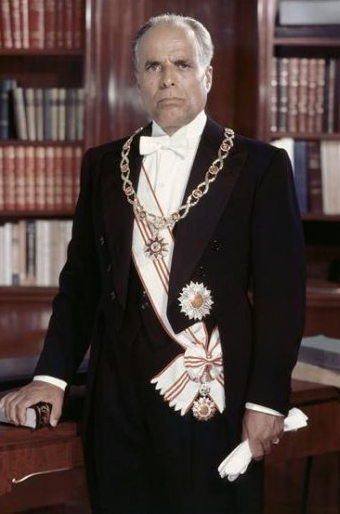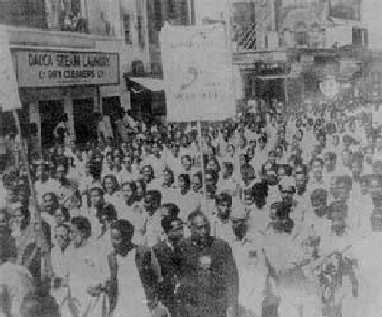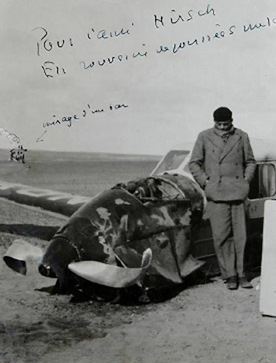|
Derja Association
Derija Association ( in Arabic; in French) is a group that advocates for the use of Tunisian Arabic (also known as 'common') as a written language. It argues for an expanded public role for the vernacular language as an authentic expression of Tunisian identity and culture. It holds an annual conference and awards prizes for literature written in Tunisian. Activities The Derja Association holds an annual conference, scheduled to coincide with International Mother Language Day. with guest speakers who present about Tunisian language. Association president, Ramzi Cherif, has described the purpose of these conferences as "raising the value and recognition of Tunisian" as well as developing it into an "independent" language. A particular focus of the association is advancing the status of Tunisian as a written language. To this end, the association maintains a library of materials written in Tunisian Arabic and offers downloadable keyboards (in Arabic letters and Latin letters) on i ... [...More Info...] [...Related Items...] OR: [Wikipedia] [Google] [Baidu] |
Tunisian Arabic
Tunisian Arabic, or simply Tunisian, is a set of dialects of Maghrebi Arabic spoken in Tunisia. It is known among its over 11 million speakers aeb, translit=Tounsi/Tounsiy, label=as, تونسي , "Tunisian" or "Everyday Language" to distinguish it from Modern Standard Arabic, the official language of Tunisia. Tunisian Arabic is mostly similar to eastern Algerian Arabic and western Libyan Arabic. As part of a dialect continuum, Tunisian merges into Algerian Arabic and Libyan Arabic at the borders of the country. Like other Maghrebi dialects, it has a vocabulary that is predominantly Semitic Arabic with a minimal Berber, Latin Tilmatine Mohand, ''Substrat et convergences: Le berbére et l'arabe nord-africain'' (1999), in ''Estudios de dialectologia norteafricana y andalusi 4'', pp 99–119 and possibly Neo-Punic substratum. Tunisian Arabic contains a few Berber loanwords which represent 8% to 9% of its vocabulary. However, Tunisian has also loanwords from French, Turkis ... [...More Info...] [...Related Items...] OR: [Wikipedia] [Google] [Baidu] |
International Mother Language Day
International Mother Language Day is a worldwide annual observance held on 21 February to promote awareness of linguistic and cultural diversity and to promote multilingualism. First announced by UNESCO on 17 November 1999, it was formally recognized by the United Nations General Assembly with the adoption of UN resolution 56/262 in 2002. Mother Language Day is part of a broader initiative "to promote the preservation and protection of all languages used by peoples of the world" as adopted by the UN General Assembly on 16 May 2007 in UN resolution 61/266, which also established 2008 as the International Year of Languages. The idea to celebrate International Mother Language Day was the initiative of Bangladesh. In Bangladesh, 21 February is the anniversary of the day when the people of Bangladesh (then East Pakistan) fought for recognition for the Bangla language. It is also celebrated in West Bengal, India. History 21 February was declared to be the International ... [...More Info...] [...Related Items...] OR: [Wikipedia] [Google] [Baidu] |
Modern Standard Arabic
Modern Standard Arabic (MSA) or Modern Written Arabic (MWA), terms used mostly by linguists, is the variety of standardized, literary Arabic that developed in the Arab world in the late 19th and early 20th centuries; occasionally, it also refers to spoken Arabic that approximates this written standard. MSA is the language used in literature, academia, print and mass media, law and legislation, though it is generally not spoken as a first language, similar to Contemporary Latin. It is a pluricentric standard language taught throughout the Arab world in formal education, differing significantly from many vernacular varieties of Arabic that are commonly spoken as mother tongues in the area; these are only partially mutually intelligible with both MSA and with each other depending on their proximity in the Arabic dialect continuum. Many linguists consider MSA to be distinct from Classical Arabic (CA; ) – the written language prior to the mid-19th century – althou ... [...More Info...] [...Related Items...] OR: [Wikipedia] [Google] [Baidu] |
Ali Douagi
Ali Douagi or Ali el-Du'aji ( aeb, علي الدوعاجي; January 4, 1909 – May 27, 1949) was a Tunisians, Tunisian literary and cultural icon who is considered to be one of the pioneers of modern Tunisian literature. He is best remembered as "the father of the modern Tunisian short story".. Douagi was also known for his versatility as a sketch artist, songwriter, playwright, and journalist. Biography Douagi was born to a wealthy family of Turkish people, Turkish origin in the city of Tunis in 1909. His father, al-Hajj Muhammad al-Du'aji who was a wealthy merchant and landowner, died when Douagi was four years old; he bequeathed to his wife and children a sizeable trust fund from which the family was able to live comfortably. His mother, Nuzhat Bint Shaqshuq, gave birth to three daughters and two sons, Douagi being the only survivor of the two sons. Thus, growing up without his father and being the only son, in part, explains why his works had come to be heavily populated b ... [...More Info...] [...Related Items...] OR: [Wikipedia] [Google] [Baidu] |
Abdelaziz El Aroui
Abd al-Aziz ( ar, عبد العزيز, DMG: ''ʽAbd al-ʽAzīz''), frequently also transliterated Abdul-Aziz, is a male Arabic Muslim given name and, in modern usage, surname. It is built from the words '' ʽAbd'', the Arabic definite article and '' ʽAzīz'' "Almighty". The name is commonly abbreviated as "ʽAzīz". The name means "servant of the Almighty", ''al-ʽAzīz'' being one of the names of God in Islam, which give rise to the Muslim theophoric names. The letter ''a'' of the ''al-'' is unstressed, and can be transliterated by almost any vowel, often by ''u''. So the first part can appear as Abdel, without spacing and hyphenation. It may refer to: Men * Abd al-Aziz ibn Marwan (died 705), Umayyad prince and governor of Egypt * Abd al-Aziz ibn Musa (died 716), governor of Al-Andalus * Abd al-Aziz ibn Shu'ayb, emir of Crete 949–961 * Abd al-Aziz ibn Mansur (ruled 1104–1121), ruler of the Hammadids (Berber dynasty) * Abdelaziz al-Malzuzi (died 1298), Moroccan poet a ... [...More Info...] [...Related Items...] OR: [Wikipedia] [Google] [Baidu] |
Hedi Balegh . ...
Hedi may refer to: Geography *Hedi language Afro-Asiatic language of Cameroon and Nigeria *Hedi List of prisons in Shanxi province *Hedi List of township-level divisions of Zhejiang Film *Hedi (film) People *Hédi (name), list of people with the name Acronyms *Healthcare Effectiveness Data and Information Set (redirect from HEDIS) {{dab Other * Hedi, an economic policy of ancient China China, officially the People's Republic of China (PRC), is a country in East Asia. It is the world's most populous country, with a population exceeding 1.4 billion, slightly ahead of India. China spans the equivalent of five time zones and ... [...More Info...] [...Related Items...] OR: [Wikipedia] [Google] [Baidu] |
The Little Prince
''The Little Prince'' (french: Le Petit Prince, ) is a novella by French aristocrat, writer, and military pilot Antoine de Saint-Exupéry. It was first published in English and French in the United States by Reynal & Hitchcock in April 1943 and was published posthumously in France following liberation; Saint-Exupéry's works had been banned by the Vichy Regime. The story follows a young prince who visits various planets in space, including Earth, and addresses themes of loneliness, friendship, love, and loss. Despite its style as a children's book, ''The Little Prince'' makes observations about life, adults and human nature. ''The Little Prince'' became Saint-Exupéry's most successful work, selling an estimated 140 million copies worldwide, which makes it one of the best-selling in history. The book has been translated into over 505 different languages and dialects worldwide, being the second most translated work ever published, trailing only the Bible. ''The Little Prin ... [...More Info...] [...Related Items...] OR: [Wikipedia] [Google] [Baidu] |
Tunisian Writers' Union
Tunisian may refer to: * Someone or something connected to Tunisia * Tunisian Arabic * Tunisian people * Tunisian cuisine * Tunisian culture Tunisian culture is a product of more than three thousand years of history and an important multi-ethnic influx. Ancient Tunisia was a major civilization crossing through history; different cultures, civilizations and multiple successive dynast ... {{Disambig Language and nationality disambiguation pages ... [...More Info...] [...Related Items...] OR: [Wikipedia] [Google] [Baidu] |
Faten Fazaâ
Faten Fazaâ ( ar, فاتن الفازع) is a Tunisian novelist and the first woman to write a novel in Tunisian Arabic. Biography Faten Fazaâ was born and raised in Tunis, Tunisia. She is the daughter of the well-known Tunisian writer and scriptwriter Tahar Fazaa. Following a difficult marriage and divorce, Fazaâ began writing on Facebook in 2013 or 2014, quickly amassing followers who enjoyed her writing and encouraged her. She began to write a screenplay, but her writing was interrupted when she emigrated to Germany. It was after the death of her grandmother, who had raised her, that Fazaa began to write her first novel, ''ʾAsrār ʿāʾilīyah'', as a way of dealing with her grief and connecting with her grandmother. This success took the author by surprise: she recounts that she had never planned to write, and in school she wasn't extraordinary in the subject. She had expected to "sell 300 copies and be done with it." Her following novels were also successful: as of M ... [...More Info...] [...Related Items...] OR: [Wikipedia] [Google] [Baidu] |
Amira Charfeddine
Amira Charfeddine () is a Tunisian novelist. Her first novel, ''Wild Fadhīla'' (Fadhila's son), was written in Tunisian Arabic and is the first major Tunisian novel to feature a gay protagonist. The novel was commercially successful, selling 2,000 copies within a month of its release in April 2019. It was awarded the Ali Douagi prize from the Derja Association for best work written in Tunisian Arabic in 2019. Career Charfeddine published her first novel, ''Wild Fadhīla'', in 2019. It tells the story of a boy, Fadhil, who is so close to his mother that everyone refers to him as ''wild Fadhila'': "Fadhila's boy." As he reaches adolescence, he finds himself unable to be attracted to his girlfriend who—after catching him about to kiss his male best friend in the library—outs him to his mother. His family refuse to let him back into the house and Fadhil is forced to live on the streets, where he discovers a seedy and dangerous underside of Tunis few have seen. Charfeddine ... [...More Info...] [...Related Items...] OR: [Wikipedia] [Google] [Baidu] |
Dhia Bousselmi
Dhia is a village in Batala in Gurdaspur district of Punjab State, India. The village is administrated by Sarpanch an elected representative of the village. Demography , The village has a total number of 60 houses and the population of 297 of which 140 are males while 157 are females according to the report published by Census India in 2011. The literacy rate of the village is 82.90%, higher than the state average of 75.84%. The population of children under the age of 6 years is 28 which is 9.43% of total population of the village, and child sex ratio is approximately 867 higher than the state average of 846. See also *List of villages in India Villages India India, officially the Republic of India (Hindi: ), is a country in South Asia. It is the seventh-largest country by area, the second-most populous country, and the most populous democracy in the world. Bounded by the Indian ... References Villages in Gurdaspur district {{Gurdaspur-geo-s ... [...More Info...] [...Related Items...] OR: [Wikipedia] [Google] [Baidu] |
Anis Ezzine
Anis ( ar, أنيس) is a masculine given name. The meaning of the name Anis is "genial" or "close friend". People In arts * Anis Mohamed Youssef Ferchichi, German rapper known as Bushido * Anis Haffar, educational theorist, teacher, columnist and author * Anis Kachohi (born 1977), French country singer * Anis Mojgani (born 1977), American spoken-word poet * Anis Nagi (1939–2010), poet * Anis Shimada, lead singer of the Japanese band Monoral * Mir Babar Ali Anis (1802–1874), Urdu poet from northern India In sport * Anis Ahmed (born 1973), field hockey player * Anis Ananenka (born 1985), Belarusian middle-distance runner * Anis Ayari (born 1982), Tunisian footballer * Anis Boussaïdi (born 1981), Tunisian footballer * Anis Riahi (born 1971), Tunisian decathlete * Anis Selmouni (born 1979), Moroccan athlete In other fields * Anis Ahmad (born 1944), social scientist, educationist and professor * Anis Ahmed (military officer) (born 1947), military officer * Anis Haffar, edu ... [...More Info...] [...Related Items...] OR: [Wikipedia] [Google] [Baidu] |


